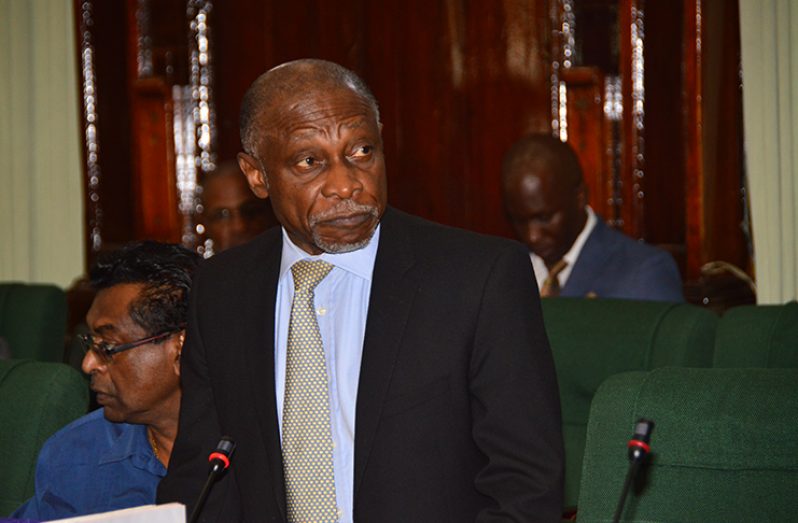– to deal with any oil spill
MINISTER of Foreign Affairs Carl Greenidge on Friday reassured Guyanese that proper systems will be put in place for the handling of any oil spills and multinational companies operating here will be monitored to ensure adherence to the country’s policies.
Greenidge made the comments during his budget debate presentation in the National Assembly on Friday. He observed that some observers have spoken about handling of oil spill as a condition for their support for exploration and production.
However, he explained that systems will be put in place to deal with the risk of such an eventuality and will see the involvement of all the local disaster management agencies. “No single developing state has ever been called to meet the cost of a petroleum spill in its entirety. States insulate themselves from the risk by insurance, industry insurance and national disaster arrangements and Guyana will be no exception in this regard,” Greenidge who is also the second vice- president said.
A former finance minister under President Desmond Hoyte’s administration, Greenidge explained that his ministry has actually already taken to Cabinet a number of existing agreements that would help in this regard. There have also been consultations with other countries more versed in the area, “including our CARICOM neighbour, Trinidad and Tobago.” “The Ministry of Foreign Affairs presented to Cabinet, and Cabinet has accepted, recommendations regarding the international agreements and conventions to which we need to be signatories. In order to benefit from such protection,” Greenidge said.
“We’ve had talks with the Trinidad and Tobago government to get insight into how they are handling their risk and how our risks may overlap, and how we can tackle these eventuality. We will also when the time comes advise cabinet to have the relevant agencies on the internal front put in place the appropriate regulations. We can have tankers operating in Guyana’s waters contributing to funds to ensure that the disaster relief arrangements are properly in place on the internal side, as well as not only on the international front,” the Foreign Affairs Minister told the House.
Greenidge said his ministry is also working on interfacing with international companies that would be looking to enter the Guyana economy, particularly as it pertains to the provisions in the labour sector. “We expect all operators to adhere to our laws and regulations,” Greenidge said. “We try to convey to the multinational corporations that they have a responsibility to live within Guyana’s laws and their performance is mutually beneficial. They have to operate with an eye on the sensitivities of the legal requirements, especially with current debate in relations to honouring labour laws.”
Well-staffed
Greenidge said that the ministry is well staffed to handle the issue, with staff being constantly trained both locally and internationally. He also spoke of the issue of the sourcing of funding for the necessary infrastructure that will need to be put in place to bring the oil and gas industry on stream, noting that there will be need to turn to a number of non-traditional sources. “There’s a most urgent need for the country is the shortage of physical and socio-economic infrastructure. And the provision of infrastructure is an area in which Guyana has struggled to secure meaningful funding over the past four decades,” he explained. “Most traditional bilateral partners have shown little interest in rendering assistance in this context, so we have to turn to non-traditional partners. Other agencies private sector and NGOs to secure funding for the development of infrastructure for that aspect.”
Only on Thursday the Inter-American Development Bank announced that it has approved a US$11.6M loan to Guyana to help it prepare to transition towards becoming a major oil and gas producing state. The policy-based loan will fund a project designed to support the strengthening and the sustainability of the energy sector in Guyana by contributing to the institutional development of oil and gas governance and the development of cleaner energy sources for electricity generation, the IDB said in a release.
The specific objectives of the loan programme are: first, to develop a management and planning framework for Guyana’s oil and gas sector; and second, to contribute to the development of a policy framework so that Guyana may diversify its electricity-generation matrix using cleaner or renewable sources.
Guyana’s new energy scenario, which will likely yield significant revenues for the government, represents a transformative shift in Guyana’s development trajectory, the IDB said, adding that it embodies a crucial and unprecedented opportunity for economic growth and sustainable development. “The conversion of short-term oil wealth into long-term, well-being hinges on the capacity of the Guyanese Government to adequately manage this new sector and enact productivity-enhancing reforms. If handled well, it can boost the overall standard of living for the country.”
However, the bank said there is considerable work to be done so that Guyana can enjoy the benefits of its recent—and potential—oil and gas wealth. “Too often resource-rich countries have become or remained poor as a result of inadequate resource management. Hence, there is an urgent need to improve the governance of Guyana’s oil and gas sector ahead of the start of production in 2020.”
The agreed-upon policy commitments of the first tranche of the programme are as follows: (1) creation of the Department of Energy (DoE) within the Ministry of the Presidency to take over responsibilities related to the governance and development of Guyana’s oil and gas sector; (2) approval by the DoE of a draft roadmap to develop Guyana’s oil and gas institutional framework, and; (3) design of a model contract for future Production Sharing Agreements (PSA) by the DoE and presented to Guyana’s Ministry of the Presidency.
On Monday, ExxonMobil announced that it has made its 10th discovery offshore Guyana and increased its estimate of the discovered recoverable resource for the Stabroek Block to more than five billion oil-equivalent barrels. The resource estimate, up from the previous estimate of more than four billion oil-equivalent barrels, is a result of further evaluation of previous discoveries and includes a new discovery at the Pluma-1 well, the company said in a statement. “The discovery of a resource base of more than five billion oil-equivalent barrels in less than four years is a testament of our technical expertise and rigorous evaluation and pursuit of high-potential, high-risk opportunities in this frontier area,” said Neil Chapman, ExxonMobil senior vice-president. “We will continue to apply what we’ve learned to identify additional exploration prospects and potential future discoveries that will deliver significant value to the Guyanese people, our partners and shareholders.”
The Pluma-1 well encountered approximately 121 feet (37 metres) of high-quality hydrocarbon-bearing sandstone reservoir. Pluma-1 reached a depth of 16,447 feet (5,013 metres) in 3,340 feet (1,018 metres) of water.



.jpg)








